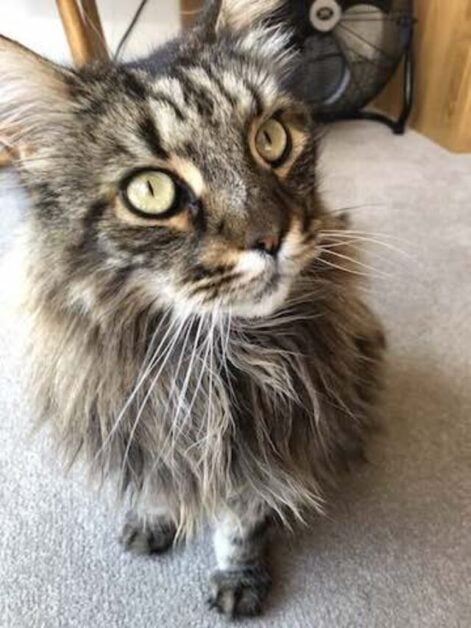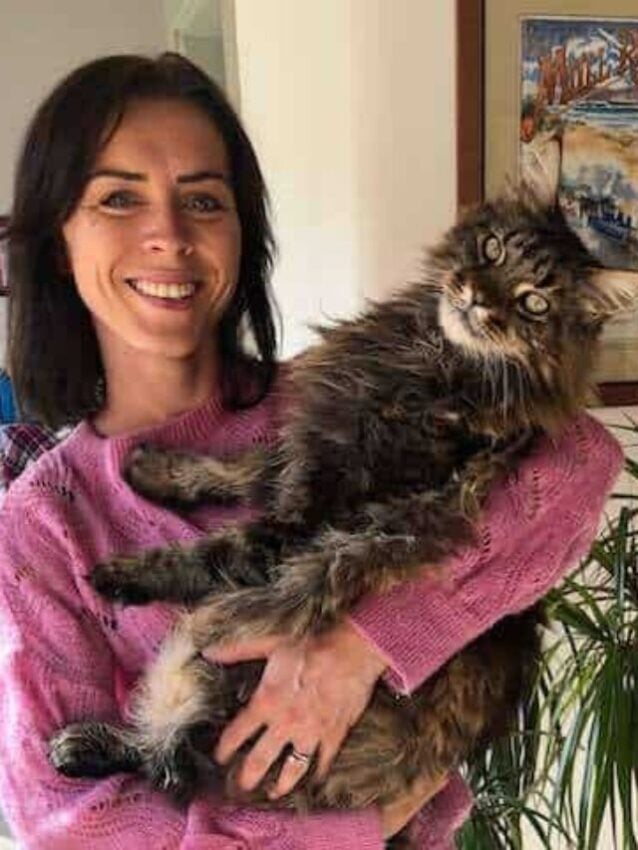Why Is My Maine Coon So Needy? Understanding Normal Bonding Behaviour In This Deeply Social Breed

If you share your home with a Maine Coon, chances are you’ve asked yourself at some point:
“Why does my Maine Coon follow me everywhere?”
“Why can’t I go to the bathroom alone?”
“Is my cat too needy?”
For many first-time Maine Coon owners, this level of attachment can feel surprising, especially if they’ve owned more independent cat breeds before. But here’s the most important thing to understand:
👉 In Maine Coons, so-called “neediness” is usually normal, healthy bonding behaviour – not a problem.
After more than fourteen years living with Maine Coons, including Pippin and Bali, I’ve come to realise that what people label as needy is actually one of the breed’s most defining and endearing traits.
What Owners Mean When They Say “Needy”
When Maine Coon owners describe their cat as needy, they usually aren’t talking about destructive or anxious behaviour.
They’re referring to things like:
- Following them from room to room
- Sitting close while they work or relax
- Watching household activities closely
- Chirping or trilling when spoken to
- Wanting to be involved in daily routines
- Becoming curious whenever the owner moves
This behaviour can feel intense, but in most cases, it isn’t anxiety at all. It’s an attachment!
Maine Coons Are One Of The Most People-Oriented Cat Breeds
Unlike many cats bred primarily for appearance, Maine Coons developed as working companions living alongside humans in homes, barns, and ships. They weren’t expected to be solitary.
They evolved to:
- Live in busy environments
- Observe people closely
- Learn household routines
- Stay near their humans for safety and cooperation
This history created a breed that doesn’t simply tolerate human company; it actively seeks it. That’s why Maine Coons are often described as:
And why they rarely enjoy being isolated.
Pippin: Constant Companionship, Not Clinginess
When Pippin was alive, he was rarely more than a few steps away from me. If I moved rooms, he followed. If I changed activities, he appeared beside me. If I sat down, he settled nearby – not always on my lap, but always close enough to stay involved.
He wasn’t anxious. He wasn’t distressed. He simply wanted to know what I was doing.
Pippin’s behaviour wasn’t attention-seeking in the traditional sense. He didn’t demand constant fuss or panic when left alone. He just preferred shared space over solitude. That curiosity, that desire to participate, is classic Maine Coon temperament.

Bali: Quiet Attachment And Constant Presence
Bali shows the same bond more quietly. He isn’t loud or demanding. He doesn’t vocalise excessively. But he almost always chooses to be in the same room as me. Sometimes he sleeps nearby. Sometimes he simply watches. Sometimes he follows and settles silently.
This type of companionship is incredibly common in Maine Coons – they don’t always need touch or attention, but they want proximity. To them, being near you is the relationship.
Why Maine Coons Follow You Everywhere
This behaviour is driven by several overlapping traits:
1. Curiosity About Human Behaviour
Maine Coons are extremely intelligent cats. They don’t just notice movement, they observe patterns:
- When you cook
- When you clean
- When you sit down
- When routines change
Many genuinely want to understand what you’re doing, not just receive attention. Our cats are a great example of this since they all know that we sit down to watch TV after dinner. If we deviated from this routine, Pippin used to always walk around the house to find us, then chirp and trill repeatedly until we followed him to the living room!!
2. Social Bonding Through Proximity
In cat behaviour, closeness equals trust. A Maine Coon following you isn’t checking on you because they’re anxious; they’re reinforcing their bond through shared space. This is the same reason bonded cats sleep near each other rather than alone.
3. Emotional Awareness
Many Maine Coons are remarkably sensitive to mood and energy changes. Owners often notice their cat becoming more present during:
- Stressful periods
- Illness
- Emotional upset
- Changes in routine
This emotional attunement can easily be mistaken for neediness when it’s actually empathy-driven behaviour.
Needy Vs Bonded: Understanding The Difference
It’s important to separate healthy attachment from true anxiety.
Normal bonding behaviour includes:
- Following you calmly
- Sitting nearby
- Relaxed posture
- Willingness to nap independently
- No distress if you leave the room
True separation anxiety may include:
- Excessive crying when you leave
- Pacing or door scratching
- Destructive behaviour
- Toileting outside the litter tray
- Refusal to eat when alone
Most Maine Coons who appear “needy” fall firmly into the bonded category, not anxious. If you want to explore that distinction further, see:
👉 Maine Coon separation anxiety explained
Why Maine Coons Are Often Described As “Velcro Cats”
Many owners affectionately describe Maine Coons as “velcro cats” – cats that stick close without being demanding.
This often includes:
- Sitting beside you instead of on you
- Watching rather than interfering
- Touching with a paw or tail
- Sleeping nearby instead of elsewhere
They want inclusion, not constant physical contact. That subtle difference is key.
Vocalising Is Often Part Of Bonding
Maine Coons are known for their soft chirps and trills rather than loud meowing.
These sounds are often used to:
- Greet you
- Acknowledge your presence
- Respond when spoken to
- “Check in” during routines
This conversational style reinforces social connection. If your Maine Coon chirps when you enter a room, that’s not distress – it’s recognition.
Related reading:
How To Support Healthy Attachment (Without Encouraging Anxiety)
You don’t need to discourage closeness, but balance is important.
Encourage Independence Gently:
- Provide beds near you and elsewhere
- Use window perches and vertical space
- Allow your cat to choose interaction
Offer Structured Engagement:
- Daily play sessions
- Predictable routines
- Mental stimulation toys
Avoid Punishment Or Pushing Them Away:
Ignoring or rejecting bonding behaviour can increase insecurity. Instead, allow closeness while also reinforcing calm independence.
Why This Behaviour Is Actually A Gift
Many cat owners dream of a cat that wants their company. With Maine Coons, that desire is built into the breed. They don’t view humans as food providers. They view them as companions.
That’s why:
- They follow instead of hiding
- They observe instead of disappearing
- They stay instead of retreating
They aren’t needy. They’re connected.
Frequently Asked Questions
Is it normal for Maine Coons to follow their owners everywhere?
Yes. The following behaviour is extremely common and reflects curiosity, attachment, and social bonding – not anxiety.
Are Maine Coons more needy than other cats?
They are more people-oriented than most breeds. What feels like neediness is usually a stronger attachment and social engagement.
Should I stop my Maine Coon from following me?
No. As long as your cat is relaxed, eating normally, and comfortable being alone at times, this behaviour is healthy.
Do Maine Coons grow out of this behaviour?
Some become slightly more independent with age, but most remain strongly bonded throughout their lives.
Can this behaviour turn into separation anxiety?
Rarely, unless routines are inconsistent or emotional needs are unmet. Structured play, enrichment, and predictability help prevent anxiety.
Why does my Maine Coon cry when I leave the room?
Brief vocalisation is normal communication. Persistent distress, pacing, or behavioural changes may indicate anxiety and should be assessed further.
Final Thoughts: “Needy” Is The Wrong Word
If your Maine Coon follows you everywhere, sits nearby while you work, or watches you move around the house, it isn’t a flaw.
It’s the result of:
- Selective breeding
- High intelligence
- Emotional sensitivity
- Deep social bonding
From Pippin’s constant companionship to Bali’s quiet presence, this behaviour reflects what makes Maine Coons so special. They don’t just share your home. They share your life.





